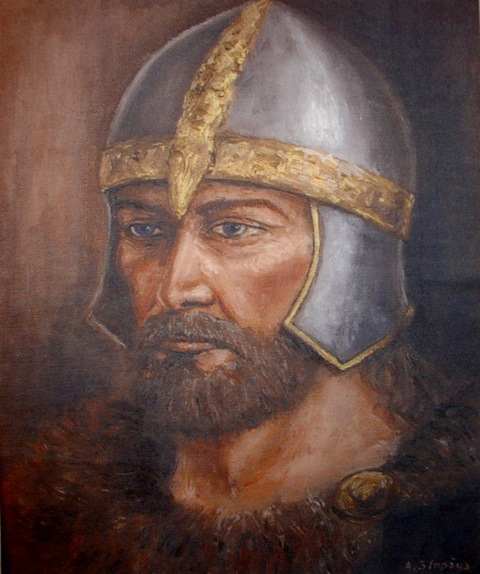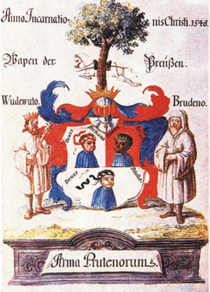
The history of ancient Prusai WHO WERE THE PRUSAI? ARCHEOLOGY COULD PRUSAI BE CHRISTIANS ? Mieszko I Poland THE ARMS AND THE WAY OF FIGHT THE CONQUEST, I, II UPRISING THE III-rd PRUSAI UPRISING The PRUSAI KNIGHTHOOD OPPOSITION What has happened to Prusai? THE GERMANIC ENSLAVEMENTS
The Battle of Grunwald
Culmland Banner The Prusai Maps
PRUSAI
Prusians Heroes Prominent Prusian Where you are, Prusai?
COAT OF ARMS
The Coat of Arms THE COAT OF ARMS PRUS I, II, III Unknown version Prus I,II, III Prus - name and Coat of Arms UNKNOWN COAT OF ARMS EUROPE MONARCHIES
PRUS DESCENDANTS
Pilewski
KURPII
The Kurppii Genesis
THE DISPUTE ABOUT HISTORY
German militarism Tadeusz Mrozinski
CULTURE
About the Prusai language The Prusai language and its sources ART AND PEOPLE Archeology Prusian Babas
PUBLICATIONS
Die Altpreußischen Personennamen Download
Elbling Dictionary
FORUM
FORUM - ARCHIVES
MAIL: PRUS@PRUSOWIE.PL
Counter
Counter

About the Prussian language
Prussian language belongs to the Indo-European and Baltic group of languages.
Till our times rest only a little bit over 2000 original prussian words :
- 802 words ( in fact they are less : ten of them are repeated ) in German-Prussian Elbing Vocabulary from 14th century written in West Prussian , Pomesanian dialect.
- Much poorer is prussian vocabulary written in Simon’s Grunau Chronic between 1510 and 1529 with only 100 words.
- They are two short versions of prussian Catechism I and Catechism II from 1545
- And finally is the biggest, third Catechism translated from Martin Luter’s Enchiridion by German priest Abel Will in 1561 in East Prussian Sambian dialect
In this texts they are many errors orthographic and linguistic.
The grammar is not consequent , with different endings, mistakes in conjugation and declination.
But prussian language is ! It is not German, Lithuanian or Polish even with this mistakes,
changed words and characters, hazard marked accents…
And my questions, repeated many times to myself are :
- How prussian language would progress if it would get the chance from the history, making simple grammar rules, taking the new words from the neighbours ?. Prussian Malunakelan, the Milling Wheel, mixing words from Lithuania, Jatvinga, Cassubia and Mazovia, never stops.
- Am I right that the middle position of Pomesanian dialect between Slavic and East Baltic languages means that the common words or roots found in Latvian, Lithuanian and Polish should be understood and used in Prussian too.
Between rare prussian epigrams is the proverb :
Deves does dantes, Deves does geitka , translated into : God gives teeth, God gives bread.
I don’t know but may be this proverb is much much older and more prussian than we expect ?
Gods give teeth, gods give bread.
And what about the philosophy, what about Great Master Immanuel from Konigsberg ?
Is everything told about him ?
And in which language ? only in German language ?
But if he had the old prussian soul ?
Free, independent , ignoring the Prussian King Frederic II and his orders.
“The Starry Sky Above Me and the Moral Law Within Me”- how it would be in Prussian language ?
Maybe so….
Lauksnan Dangus
Some noise woke him. Was it Lampe, crying “time to get up” ? He stretched his arms and
looked through the trees, but there was nothing to be seen. The view of the castle’s towers always
helped him to think and for long time he only imagined seeing them. But today the dark room seemed
to be something unusual, he felt he had overslept. As if it was already afternoon!
What had woken him ?
Maybe a dream …? He opened the window but the sounds of awakening Konigsberg were intolerable.
Must they drive the loudest carriages under his window? Or the cries of the people: wasn’t it
better to explain one’s opinions quietly, only with a few gestures to stress the arguments?
Is the world, in its appeal to be recognized, real so as to give such a question to him, to the
man and his brain?
Yesterday the priest from Elbing brought him an old manuscript – the words in the columns,
written with nice rounded writing : explicit per manus Petri Holczwesscher De MaierenBurg.
German and Prussian words.
He had already thought to collect old stories and legends among old Prussians in the villages,
but that world was a dead world, as dead as a thousand-year-old oak bole, felled by time.
His grandmother on his father’s side had told him about his great-grandfather
Quant, but he – Immanuel – was so weak in body, he could not even ride a horse, much less take
the sword and fight with it for freedom !
One thing he knew was to use the word, so he wrote.
He remembered yesterday’s thoughts.
So he looked up Prussian words in the dictionary.
On the first page, just after God and an Angel are the Heaven and Stars, Sun, Moon,
Clouds, and then Hell and the Devil.
Is that an accident, or is there some deeper thought in such an order of words? Maybe someone
had already had thoughts similar to his own?… Petri Holczwesscher for instance?
God and his confidant of Good and Love – the Angel, the sky above, Hell and its heralds of Evil
and Hate - the Devil…
And if it should be Man who created God with the ability of his brain, whence would he know
what was to be called virtue and what vice ?
Or can he, left alone with the huge Universe, distinguish good things from bad ...?
Servant Lampe cried through the door :
“Sir! Two priests came with a letter from His Lordship Gise from Torun and they
would like to see you, learned master.”
“I will come in a moment. ...”
Two lean youths looked at him.
One of them gave him a letter.
They competed with each other to flatter him, and he felt that they were doing so in order
to share some of his glory. He disliked crawlers, but he asked them about life in Torun,
which is always another world than Konigsberg with the censors of Frederick II.
He showed them the library, and the works of Horace.
They sat down to a late lunch. At table, he looked at the letter. It was not necessary to
answer immediately…
They bored him greatly.
They had no ideas of their own, merely
sweet statements about his learning and the grace of the Almighty.
When they had gone, he said:
“I am tired of these continual visits. You will only admit someone to cross the threshold
and enter my room through the open door in order to see how I cogitate, or how I write, or
how I am not” (and here he probably smiled).
“And you are to take from everybody one Mark,” he ordered.
“I am going for a walk.”
And if it were Man who created God with the ability of his brain, whence would he know what
is to be called virtue and what vice?
Or can he, left alone with the huge Universe, distinguish good things from bad ...
But if Man knows, if he is born and the moral law is within him, he can distinguish good things from bad.
If he can censure base things ...
Someone told him that Koenigsberg lived by the rhythm of his afternoon walks to the fortress.
Jokes circulated about shopkeepers setting their clocks by his steps…
He would turn the joke on them! He turned into a side street.
Are people ready to believe such an absurdity ? Could he abstain from the splendid parties
that were honoured by his presence?
Or the society balls with beautifully dressed ladies and the music so pleasing to the ears?
Could he give up the interesting meetings and talks just because of one baker who had already
sold all his bread but he did not know what time to close his bakery ?
He didn’t notice that it was getting dark. He looked at the sky – the stars, as if they were
cut with a knife, shone as brightly as if they were double or triple.
He came back home.
He dismissed the servant with an impatient gesture.
He did not even light a lamp.
He went to bed without eating.
The sky, kindled by the stars, pulsed over the tops of the trees.
If we forbid ourselves something, we do so in accordance with our conscience. Or we are taught to do so.
Or we are afraid of paying a penalty.
Or rather, we desire a reward for not submitting to temptation and for living in virtue.
He ought to write that in his notebook, these non-ordered thoughts.
After all, it is they, the stars, that watch the man, they look at his every move, they hear
every word he says.
Just in the night, when the brain thinks its secret thoughts.
He thought about Anna – a few days ago they talked in her living-room and he persisted in his opinion:
a woman can only disturb the work of philosophy.
Any relationship with a woman – can mean only one thing, limits to one’s freedom and an increase
in obligations.
“But you are a handsome man, you have beautiful hands and lips, and an attractive look in your eyes.
How can you live without love?”
She had in her hands a few roses from the garden, which she put into a vase.
He felt a wave of hotness come over him. - No, it’s impossible - a woman will bring only troubles …
“If you would take a rose from me I would know that your solitude is only a coincidence.”
“No, no, they are your roses, worthy of your beauty.”
“But I’d like to give just one of them to you, so that you would become acquainted with love.
Take it, please.”
He again fell the hotness: she was so near, and then this smell of roses.
He remembered, yes!
He put out his hand.
A thorn went into his finger.
He looked at the growing drop of blood. From his pocket he quickly took his handkerchief.
What happened to the rose ?
It felt to the floor. Anna picked it up and laid it on the table.
He turned his finger with its fat, awkward bandage.
“Let me.”
He withdrew his hand.
“No, I’ll do that myself.”
He felt the touch of her fingers. Gently she opened his closed fist.
“Let me love you, Immanuel. With me behind you, you will write books that are more splendid,
cleverer …”
“No, let it be. I will do it by myself.”
He pushed her fingers away. She did not yield.
He fell the temptation rising in him too.
“I know that you are a great lover of solitude.”
“Anna, you have a husband.”
If only he wouldn’t say that word.
He fell that the all charm of the meeting had disappeared.
Brushing away a trace of blood, she wrapped his middle finger with an even, tight dressing.
“It would be better if you did not do everything alone. But if you must, you should
know how to do it.”
He fell asleep.
Next morning, when he looked for the the manuscript, he could not find it. It ought
to be lying on the desk in the library.
How could that be?
“Did you touch anything? Did somebody else come?”
The servant only shrugged.
“It was a priest. He brought the books borrowed from your library, Sir.
“It wasn’t the first time. Mostly they steal pens and paper for letters. Or the ink-wells.”
“Dandies! Sanctimonious dandies ! I have already ordered you : admit people only to
cross the threshold and come through the open door to my room, so as to see how I cogitate,
or how I write. And if somebody comes without a letter, only to have a look, charge him one Mark!”
He searches his memory for words: Dangus = Heavens, Lauksnos = Stars.
“Lauksnan dangus kirsa maim, moralan tikre enmien.”
Yes, just so.
He can’t see Anna any more. And the last letter from Marie-Charlotte: shameless, touching him
under the table…
No.
He must be alone.
Otherwise he will not achieve anything great, he will not write anything of importance.
=============
Mattis Piegat, Jerzwald, Pomeza Tauto
Januarius 2006
 www.Prusowie.pl - polski
www.Prusowie.pl - polski